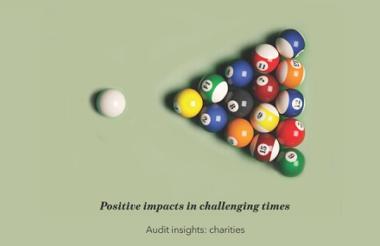Charities spend too little on necessary support for staff and are not transparent because they fear criticism over their costs, according to a report based on insights from their auditors, published in full today.
The report, Audit insights: charities - positive impacts in challenging times, is published by the Institute for Chartered Accountants in England and Wales (ICAEW) and is based on insights from staff at seven of the largest charity auditors.
It says that charities are often "less than transparent" in their reporting to the public, and make "suboptimal spending decisions" because they are concerned about criticism over "the proportion of income not going directly to the cause".
It says trustees have often spent on what they think will be perceived well by supporters, not what is needed by the charity and its beneficiaries.
It says charities have been guilty of “perpetuating the myth that reduced overheads mean the charity is more effective” and that this has led to “a vicious cycle of underinvestment” which has meant too little funding for technology, training, governance and management – making the sector less effective as a result.
The report also says that many charities are not reporting results transparently, are not recruiting sufficiently diverse trustee boards, and are creating reserves policies to justify their existing funds, rather than to meet strategic need.
Spend on need, not perception
"Trustees and management have often shied away from making investment decisions because they believe that it will impact negatively on how they are perceived," the report says. “This is due to the misleading belief that charities can be measured and compared by looking at their expenditure and the income raised.
“This belief has resulted in underinvestment in vital areas such as information technology, skills training, income generating processes and governance and management. Charities are also to blame by perpetuating the myth that reduced overheads mean the charity is more effective. This leads to a vicious cycle of underinvestment and this can actually lead to a deterioration in a charity’s performance.
"Charities should be ready to make the necessary investment in infrastructure based on what is needed rather than how it may be perceived."
Report transparently
Charities need to be more pro-active in explaining the impact of their work, the report says.
It says the failure to provide information about what the charity achieves "is creating a deficit gap which is being filled with flawed commentary about cost and expenditure ratios".
"Figures in financial statements are often a poor measure of the effectiveness of charities. Because charities often fail to provide other vital information on a consistent basis, these figures are often used as a spurious measure of effectiveness," it says.
It said charities can make "suboptimal spending decisions" to make figures appear better in financial reports, and can be "less than transparent" about costs, to make themselves appear more attractive to supporters.
Recruit the right trustees
"A number of charities have rules and structures that can prevent them from attracting all the skills they need," the report says. "For example, the rules may require that the board is elected from a particular constituency and, while this can be important, it needs to be recognised that good representation is not necessarily the same as good governance. If the election process does not lead to the right mix of skills then it should be supplemented by selection.
"Charities also need to ensure there are fresh perspectives on the board. Diversifying the board can boost public confidence, bring additional expertise and generate new ideas that improve the impact of a charity’s work.
"Studies suggest that many trustee chairs are white and male; charities should do more to attract trustees from under-represented sections of our communities."
In Charity Finance
Develop effective reserves policies
The report says that too many charities “have reserves policies to justify their existing reserves” rather than considering what reserves are actually needed.
It says charities should use accounts to explain longer-term trends in their reserve levels, for example over five years, rather than focusing on each year in isolation.
"While there has been guidance from the regulator on reserves policies, some trustees continue to pay lip service to the recommendations," the report says. "Charities need to consider relevant guidance and how this applies to their circumstances."
|
Related articles












